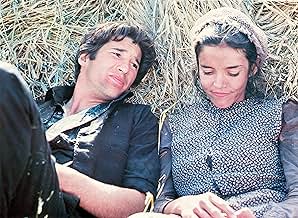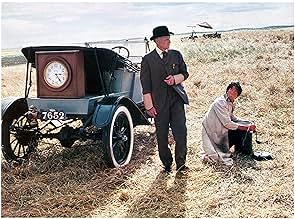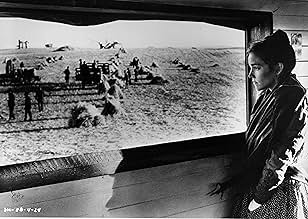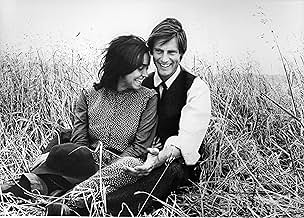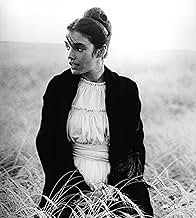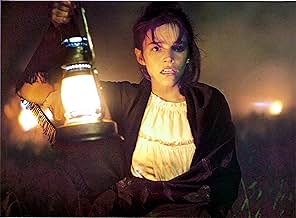एक गर्म स्वभाव वाला खेत मजदूर उस महिला को आश्वस्त करता है जिसे वह अपने अमीरों से शादी करना पसंद करता है।एक गर्म स्वभाव वाला खेत मजदूर उस महिला को आश्वस्त करता है जिसे वह अपने अमीरों से शादी करना पसंद करता है।एक गर्म स्वभाव वाला खेत मजदूर उस महिला को आश्वस्त करता है जिसे वह अपने अमीरों से शादी करना पसंद करता है।
- 1 ऑस्कर जीते
- 13 जीत और कुल 13 नामांकन
Robert J. Wilke
- The Farm Foreman
- (as Robert Wilke)
Timothy Scott
- Harvest Hand
- (as Tim Scott)
Terrence Malick
- Mill Worker
- (बिना क्रेडिट के)
फ़ीचर्ड समीक्षाएं
Terrence Malick is less a storyteller than a visual poet. At times, the images in 'Days of Heaven (1978)' seem too beautiful to be believed – could Mother Nature even construct such moments of magnificence at her own accord? Cinematographers Néstor Almendros and Haskell Wexler (credited only as "additional photographer") consistently shot the film during the "magic hour" between darkness and sunrise/sunset, when the sun's radiance is missing from the sky, and so their colours have a muted presence, as though filtered through the stalks of wheat that saturate the landscape. Crucial alongside the film's photographers are composer Ennio Morricone – utilising a variation on the seventh movement ("Aquarium") in Camille Saint-Saëns's "Carnival of the Animals" suite – and a succession of sound editors, whose work brings a dreamy, ethereal edge to the vast fields of the Texas Panhandle. The film's final act, away from the wheat-fields, recalls Arthur Penn's 'Bonnie and Clyde (1967),' but otherwise Malick's style, contemplative and elegiac, is in a class of its own, more comparable perhaps to Kurosawa's 'Dersu Uzala (1975).'
Malick refuses to explore his characters' motivations. The viewer is deliberately kept at an arm's length, and Malick eschews cinema's traditional notions of narrative development. Instead, the story is told as a succession of fleeting moments, the sort that a young girl (the film's narrator, Linda Manz) might pick up through her day-to-day experiences and muted understanding of adult emotions. Note that the girl is always kept separate from the dramatic crux of the film – the love-triangle between Billy, Abby, and the Farmer – and her comprehension of events is tainted by her adolescent grasp on adult relationships and societal norms. I was reminded of Andrew Dominik's recent 'The Assassination of Jesse James by the Coward Robert Ford (2007)' {another sumptuously-photographed picture}, which also refused to explore its title character, Jesse James, kept at a distance through the impartial objectivity of the historical narrator. In Malick's film, Linda's narration tells us one thing, and the viewer sees another. But one can never fully understand the complex emotions driving human behaviour, so perhaps the girl's perspective is as good as any other.
'Days of Heaven' derives its title from a passage in the Bible (Deuteronomy 11:21), and Malick's tale of jealousy and desire is suitably Biblical in nature. Essential to this allegory is an apocalyptic plague of locusts, which descend upon the wheat-fields like an army from the heavens. When the fields erupt into flame, quite literally from the broiling emotions of the film's conflicted characters, the viewer is confronted by the most intense manifestation of Hell-on- Earth since the burning village in Bondarchuk's 'War and Peace (1967).' But, interestingly, Malick here regresses on his own allegory: Judgement Day isn't the end, but rather it comes and goes. Life is driven by the inexorable march of Fate: The Farmer (Sam Shepard) is doomed to die within a year; Bill (Richard Gere) is doomed to repeat his mistakes twice over. In the film's final moments, Linda and her newfound friend embark purposelessly along the railway tracks, the tracks being a physical incarnation of Fate itself: their paths are laid down already, but we mortals can never know precisely where they lead until we get there.
Malick refuses to explore his characters' motivations. The viewer is deliberately kept at an arm's length, and Malick eschews cinema's traditional notions of narrative development. Instead, the story is told as a succession of fleeting moments, the sort that a young girl (the film's narrator, Linda Manz) might pick up through her day-to-day experiences and muted understanding of adult emotions. Note that the girl is always kept separate from the dramatic crux of the film – the love-triangle between Billy, Abby, and the Farmer – and her comprehension of events is tainted by her adolescent grasp on adult relationships and societal norms. I was reminded of Andrew Dominik's recent 'The Assassination of Jesse James by the Coward Robert Ford (2007)' {another sumptuously-photographed picture}, which also refused to explore its title character, Jesse James, kept at a distance through the impartial objectivity of the historical narrator. In Malick's film, Linda's narration tells us one thing, and the viewer sees another. But one can never fully understand the complex emotions driving human behaviour, so perhaps the girl's perspective is as good as any other.
'Days of Heaven' derives its title from a passage in the Bible (Deuteronomy 11:21), and Malick's tale of jealousy and desire is suitably Biblical in nature. Essential to this allegory is an apocalyptic plague of locusts, which descend upon the wheat-fields like an army from the heavens. When the fields erupt into flame, quite literally from the broiling emotions of the film's conflicted characters, the viewer is confronted by the most intense manifestation of Hell-on- Earth since the burning village in Bondarchuk's 'War and Peace (1967).' But, interestingly, Malick here regresses on his own allegory: Judgement Day isn't the end, but rather it comes and goes. Life is driven by the inexorable march of Fate: The Farmer (Sam Shepard) is doomed to die within a year; Bill (Richard Gere) is doomed to repeat his mistakes twice over. In the film's final moments, Linda and her newfound friend embark purposelessly along the railway tracks, the tracks being a physical incarnation of Fate itself: their paths are laid down already, but we mortals can never know precisely where they lead until we get there.
"Days of Heaven" is a beautiful film with fantastic panoramic cinematography. It's hard to say what it is about this film that captivated me from the start. I didn't expect to enjoy it when I read about the plot. Farm workers? How could that be interesting... But oh, the haunting, heavenly silence of the fields undulating in the wind, a silence not sundered by any garish music. Everything about this film is tangible, real, alive. The dialogue is sparse, believable, the bond between Bill and Abby is one of quiet passion that needs no dramatic proclamations to fuel it. And Sam Shepard's farmer is touching. I don't use that word very often, but I'll venture it here. I have watched this film now several times, and it is a delight each time when the farmer first sees Abby. This perhaps the strongest and most believable love triangle ever put to film, and in my opinion, the most compelling.
Welcome to the world of Terrence Mallick where the cinematography is awesome (courtesy of Nestor Almendros) and the dialogue and characters are an afterthought. How else to explain the Brooklyn accents of people supposedly hailing from Chicago? One gets the distinct impression that were this to be pointed out to Mallick he would benignly shrug, such petty concerns of characterization being of secondary or tertiary concern to Mr. Landscape. Give me Ford any day who, like all great film makers, never let his locations, no matter how majestic, dwarf his people. C plus.
This is gorgeous looking film very much filmed at dusk and dawn. A film misunderstood upon its time of release and only after Terrence Malick's subsequent films can you now understand what the writer- director was aiming at.
The fact that Malick's next film emerged 20 years later we understand this is a person who wants to tell his story by visuals. Actors talking is just secondary and those scenes end up on the cutting room floor.
Days of Heaven which was shot in 70mm always had a reputation for its Cinematography which won an Oscar.
Now we can marvel at it in our homes on widescreen high definition television. You can really have those close ups of those insects. It is also a surprisingly short film, coming in at just over 90 minutes.
The tale is slight, Gere is a hothead with a girlfriend that is pretending to be his sister and his actual younger sister. They get a job whilst fleeing from Chicago in a farm in Texas where the Farmer played by Sam Shepard takes a shine to the girlfriend and marries her. Gere is aware that the Framer only has a year to live.
Apparently the film took several years to be edited and the narration from the youngest sister had to be added to make the story flow. A similar device was used by Malick in 'The Thin Red Line.'
The film might be seen as slow and maybe hard to fathom because there is relative little dialogue but as mentioned you admire the visuals and at 90 minutes it is not as slow moving as you think.
A brave beautifully crafted film.
The fact that Malick's next film emerged 20 years later we understand this is a person who wants to tell his story by visuals. Actors talking is just secondary and those scenes end up on the cutting room floor.
Days of Heaven which was shot in 70mm always had a reputation for its Cinematography which won an Oscar.
Now we can marvel at it in our homes on widescreen high definition television. You can really have those close ups of those insects. It is also a surprisingly short film, coming in at just over 90 minutes.
The tale is slight, Gere is a hothead with a girlfriend that is pretending to be his sister and his actual younger sister. They get a job whilst fleeing from Chicago in a farm in Texas where the Farmer played by Sam Shepard takes a shine to the girlfriend and marries her. Gere is aware that the Framer only has a year to live.
Apparently the film took several years to be edited and the narration from the youngest sister had to be added to make the story flow. A similar device was used by Malick in 'The Thin Red Line.'
The film might be seen as slow and maybe hard to fathom because there is relative little dialogue but as mentioned you admire the visuals and at 90 minutes it is not as slow moving as you think.
A brave beautifully crafted film.
I can understand why Malick didn't make another movie after he made Days of Heaven. The film was panned by the majority of the critics who could only find the cinematography worthy of praise. However, Malick was hugely misunderstood by these dumb critics.
They complain that the film is ponderously slow. This was the intention. Malick used pause to convey that the characters think. Too many actors rattle off their lines without letting their characters think of them. It also conveys the slow pace of their lives.
Critics complain that the characters are too remote - one feels removed from them and can't get involved. Hello! It is narrated by a 13 yr old and is essentially her view of the events that transpired. Naturally she does not grasp most of the more adult moments between them and thus is herself removed from being fully involved in Bill and Abby's relationship and that is what has to come across.
Then Malick, in a moment of genius, allied the four main characters to the four elements; Earth, Air, Fire & Water. Bill is Fire - he is seen at first in front of the furnaces of a foundry where he works. We can see his temper is volatile. Abby is water - in the very first shot she is scavenging(?) by a stream and she is seen against the backdrop of the river. Linda is Earth - In her narration she says that she is close to the "Oith". The Farmer is Air - constantly tinkering with his weather vane, and his fields of wheat are often seen waving in the wind.
All in all a severely mies-judged film and the critics owe Malick a huge apology. The work is pure genius!
They complain that the film is ponderously slow. This was the intention. Malick used pause to convey that the characters think. Too many actors rattle off their lines without letting their characters think of them. It also conveys the slow pace of their lives.
Critics complain that the characters are too remote - one feels removed from them and can't get involved. Hello! It is narrated by a 13 yr old and is essentially her view of the events that transpired. Naturally she does not grasp most of the more adult moments between them and thus is herself removed from being fully involved in Bill and Abby's relationship and that is what has to come across.
Then Malick, in a moment of genius, allied the four main characters to the four elements; Earth, Air, Fire & Water. Bill is Fire - he is seen at first in front of the furnaces of a foundry where he works. We can see his temper is volatile. Abby is water - in the very first shot she is scavenging(?) by a stream and she is seen against the backdrop of the river. Linda is Earth - In her narration she says that she is close to the "Oith". The Farmer is Air - constantly tinkering with his weather vane, and his fields of wheat are often seen waving in the wind.
All in all a severely mies-judged film and the critics owe Malick a huge apology. The work is pure genius!
क्या आपको पता है
- ट्रिवियाThe shot of locusts ascending to the sky was shot in reverse with the helicopter crew throwing peanut shells down, and actors walking backwards.
- गूफ़Towards the end of the movie, Bill fires three shots from a double-barreled shotgun without reloading.
- साउंडट्रैकEnderlin
Written and Performed by Leo Kottke
Used by permission of Overdrive Music A.S.C.A.P. Copyright 1978
टॉप पसंद
रेटिंग देने के लिए साइन-इन करें और वैयक्तिकृत सुझावों के लिए वॉचलिस्ट करें
- How long is Days of Heaven?Alexa द्वारा संचालित
विवरण
- रिलीज़ की तारीख़
- कंट्री ऑफ़ ओरिजिन
- भाषाएं
- इस रूप में भी जाना जाता है
- Días de gloria
- फ़िल्माने की जगहें
- Lethbridge, अल्बर्टा, कनाडा(Lethbridge Viaduct High Level Railroad Bridge)
- उत्पादन कंपनी
- IMDbPro पर और कंपनी क्रेडिट देखें
बॉक्स ऑफ़िस
- बजट
- $30,00,000(अनुमानित)
- US और कनाडा में सकल
- $34,46,749
- दुनिया भर में सकल
- $34,92,909
- चलने की अवधि
- 1 घं 34 मि(94 min)
- रंग
- पक्ष अनुपात
- 1.85 : 1
इस पेज में योगदान दें
किसी बदलाव का सुझाव दें या अनुपलब्ध कॉन्टेंट जोड़ें




